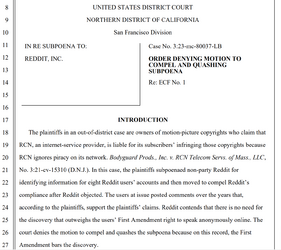Court Protects Redditors' Right to Anonymous Speech in Piracy Case * TorrentFreak
A California federal court has denied a request by film companies to compel Reddit to unmask several anonymous Redditors.

Court Protects Redditors' Right to Anonymous Speech in Piracy Case * …
archived 1 May 2023 10:44:30 UTC
A California federal court has denied a request to compel Reddit to unmask several anonymous Redditors. Film companies say the users' comments could serve as relevant evidence in a piracy liability case against Internet provider RCN. However, the court believes that the Redditors' First Amendment right to anonymous speech outweighs the interest of rightsholders.
Every day, millions of people from all over the world submit posts, comments, and other content to Reddit.
In many cases, discussion comments are read and soon forgotten but several old threads were brought back to life recently as part of a piracy liability case.
Redditors as Evidence
The comments in question were picked up by Kerry Culpepper, a copyright attorney who leads several piracy lawsuits against Internet providers on behalf of independent film companies.In the case at hand, the makers of The Hitman’s Wife’s Bodyguard, London Has Fallen, Hellboy and other films, accuse Internet provider RCN of not doing enough to stop subscribers from pirating on its network. Instead of terminating the accounts of persistent pirates, the ISP turned a blind eye, the filmmakers argued.
The main lawsuit was filed at a federal court in New Jersey and the parties are in the process of gathering evidence. As part of this quest, the filmmakers stumbled upon responses from nine Reddit users, whose comments are potentially relevant to the dispute.
For example, a comment from Redditor “ChikaraFan” noted the following regarding RCN’s handling of copyright infringement emails:
“Seems extremely rare if ever. RCN seems fairly lax…no data caps. I looked up before I switched and had little trouble.”

Reddit doesn’t usually give up the identities of its users. However, in February the movie companies obtained a subpoena asking Reddit to share the personal details of nine users, including relevant IP-address logs.
Reddit Objects
Reddit was unhappy with the subpoena, characterizing it as overbroad. According to Reddit’s lawyers, the subpoena was more akin to a fishing expedition than regular evidence gathering. As such, Reddit only handed over the details of one user whose comment mentioned RCN, denying other ‘less relevant’ ones, citing the users’ First Amendment right to anonymous speech.This refusal to hand over user data triggered the filmmakers to file a motion to compel. Since the subpoena was issued in California, the motion was handled there as well, separate from the main lawsuit.
The case was heard last week by U.S. District Court Magistrate Judge Laurel Beeler via a virtual hearing over Zoom. Since Reddit previously handed over information relating to one user, the identities of eight others was at stake.
From the get-go, the Judge said that she was inclined to deny the motion to compel, thereby protecting the Redditors’ right to anonymous speech. The film companies’ attorney, Kerry Culpepper, was still allowed to present his arguments.
Culpepper argued that the comments are highly relevant to show that RCN didn’t have a proper repeat infringer policy. In addition, they could help to show that RCN can monitor its subscribers and that its lax policies acted as a draw to potential customers.
As the only party able to identify the commenters, Reddit’s role is essential, the filmmakers’ attorney said. Without Reddit’s help, obtaining this information simply isn’t possible.
Anonymous Speech Outweights Rightholders’ Interests
While Judge Beeler acknowledged the potential interest the filmmakers have in the user data, in this case the Redditor’s right to remain anonymous outweighs the interests of the rightsholders.According to the court, the comments are too general and, for some users, it is not even clear that they’re RCN customers. When added to the fact that the subscribers are not suspected of any wrongdoing themselves, the balance tips in favor of the Reddit users.
“The court denies the motion to compel and quashes the subpoena because on this record, the First Amendment bars the discovery,” Judge Beeler writes in her order, issued shortly after the hearing.

Other Ways to Get Information
The court’s standard for review was whether the Redditors’ comments were directly and materially relevant to a core claim or defense. Judge Beeler doesn’t believe that’s the case here, as there are other ways for the filmmakers to back up their claims against RCN.For example, through discovery, the plaintiffs can obtain information about RCN’s repeat infringer policy and data caps from the company itself.
The above-mentioned comment from the user ChikaraFan was the “closest call” according to Judge Beeler. It makes sense for the filmmakers to want this evidence but Reddit doesn’t have to share the user’s personal details.
“ChikaraFan was apparently drawn to RCN’s lack of ‘data caps,’ which is another technical issue that can be illuminated by discovery from RCN itself,” Judge Beeler writes.
“Even as to the issue of customers being drawn to RCN, the question here is whether the information is available from ‘any’ other source. It is implausible that this one (First Amendment protected) user is an irreplaceable source.”
The denial means that the identity of the eight Reddit users won’t be shared with the filmmakers. While these users aren’t accused of any wrongdoing, not being dragged into a copyright dispute through the side door is likely to be a relief.
—
A copy of U.S. District Court Magistrate Judge Laurel Beeler order on the motion to compel is available here (pdf)